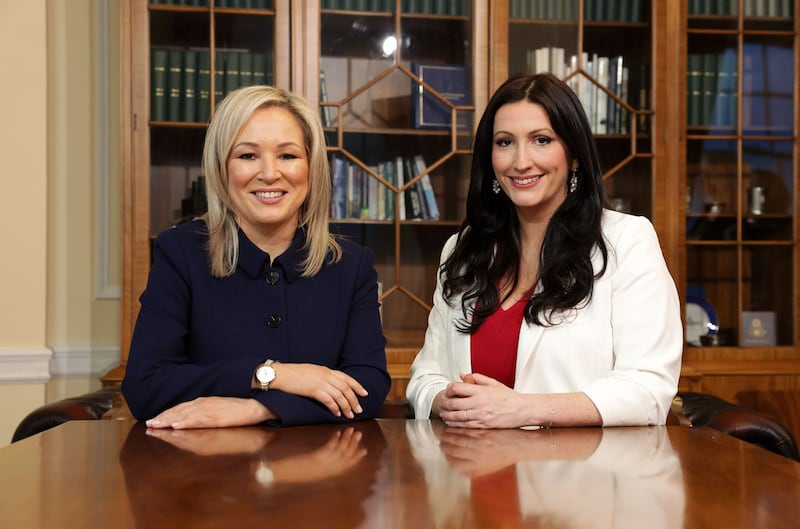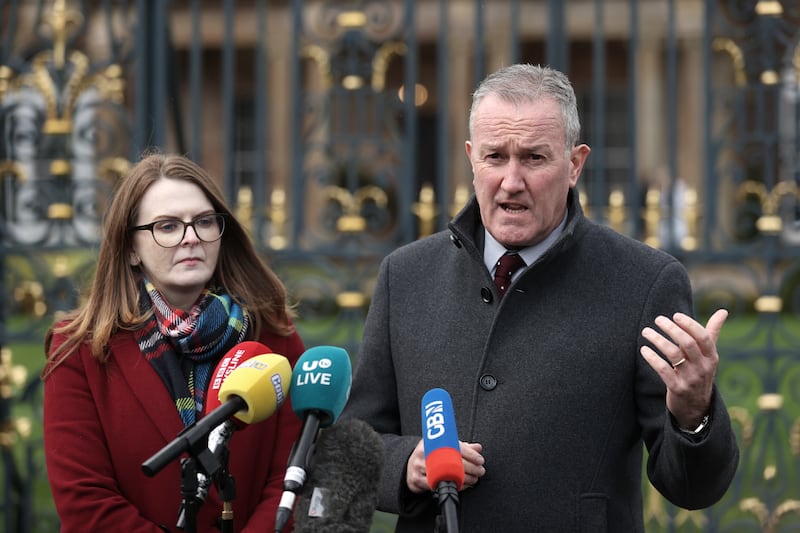Times have certainly changed. We have known since 2022 that Sinn Féin had secured the first minister’s post, but Saturday’s events at Stormont still had potency.
There was a touch of Disney about it. Michelle O’Neill, restored to her rightful place, forgave those who tried to thwart her. Although “bridesmaid” Emma Little-Pengelly hadn’t auditioned before the electorate, the director’s favourite got the part anyway; and she read her lines well. Deposed King Poots was restored to glory, to the delight of dinosaurs everywhere.

- The Irish News view: After Saturday’s applause and congratulations, it’s time for Stormont to deliverOpens in new window
- Who are the new ministers sitting around the executive table at Stormont?Opens in new window
- Stormont’s in-tray: The multiple funding crises facing a new executive from health to education, the A5, policing and Casement ParkOpens in new window
Even a wicked witch appeared. Channelling Maleficent, Jim Allister enunciated his curse with the bluster of a ham actor who thinks he has a leading role but doesn’t even merit a listing on the credits.
(Note to BBC – let this be the last we hear of Allister. Representing only himself, he has exhausted his Warholian 15 minutes of fame. As Mike Nesbitt noted, by turning up he effectively signed up to Donaldson’s deal. He has no credibility.)
Given ends matter more than means, the Tory-DUP deal has passed almost unnoticed – save for Colum Eastwood’s incisive criticism of its sectarian underpinnings.
Ill-informed commentators are hailing it as a Sunak success. Rather, it’s another sign of his misunderstanding of the Good Friday Agreement. Thank god there is an election coming – Sunak is a threat to peace and stability.
Although Saturday represented a moment of hope, this assembly will be judged on how it discharges its mandate. History suggests the fairy tale will end up a nightmare, and it might. But it need not be that way if the parties put the electorate before their own narrow political interests.
It is incumbent on every MLA to put a shoulder to the wheel, to make it turn, and to add their collective strength when this proverbial wheel gets stuck, as it will.
We are well past the stage when the electorate’s day-to-day needs outweigh the constitutional question. That was settled more than 25 years ago.
As O’Neill said, it is time to move forward. Each of the ministries has a significant job to do. Sinn Féin holds the key economic departments – as well as driving the economy forward, exploiting fully our position within the European and British single markets, the party must enable its political rivals to make a success of their briefs.

If Robin Swann does not sort out health, everyone loses. Paul Givan’s role at education is pivotal if our young people are to realise their full potential; Andrew Muir needs to deal with the environmental catastrophe we are all experiencing.
Difficult choices will have to be made. Voters want to see change, but often don’t welcome reform when it affects them. As an electorate we have to be mature enough to accept necessary change, and politicians have to be brave enough to push it through.
One of the hardest jobs in this new political dispensation falls to opposition leader Matthew O’Toole. ‘Responsibility without power’ is a curse more potent than anything from Maleficent’s lips.
But government parties need tested, decision-making must be examined and queried, ministers must be held to account. O’Toole has scant resources to do the job properly. There are more ministers than there are SDLP MLAs.
But he can make a difference with intelligent opposition – prioritising those areas the electorate prioritises too, and ensuring decision-making is robust and in all our interests.
History suggests the fairy tale will end up a nightmare, and it might. But it need not be that way if the parties put the electorate before their own narrow political interests
In this context, the proper role now for the media is also to hold government to account rather than showcasing self-appointed disrupters.
The BBC in particular needs to look hard at the totality of its output, focusing on the public service ethos of its best journalists. Despite appearances, Stormont is not the NI version of The Traitors.
Everyone, including the media - whose role is to ensure accountability - has a responsibility to make sure this new government goes down in history for what it has achieved, not just for who leads it.
I suspect that is what Michelle O’Neill wants too.


